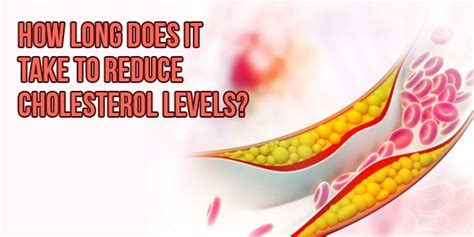How Long Does It Take To Lower Cholesterol? A Comprehensive Guide
Lowering cholesterol is a journey, not a sprint. The time it takes to see significant improvements varies greatly depending on several factors, including your current cholesterol levels, the severity of your condition, your lifestyle choices, and the treatment plan your doctor prescribes. This guide will explore the timeline and factors influencing cholesterol reduction.
Understanding Cholesterol and its Impact
Before diving into timelines, let's briefly understand cholesterol. High cholesterol, specifically high levels of LDL ("bad") cholesterol, increases your risk of heart disease and stroke. HDL ("good") cholesterol helps remove LDL from your arteries. The goal is to increase HDL and decrease LDL.
Factors Affecting Cholesterol Reduction Timelines
Several factors influence how quickly you see results:
1. Your Starting Point:
- High Cholesterol: If you have very high cholesterol, it might take longer to see significant drops. Consistent effort is key.
- Moderate Cholesterol: With moderate levels, you might see changes more quickly, especially with lifestyle changes.
- Already Low Cholesterol: If your cholesterol is already within a healthy range, focusing on maintaining those levels is crucial.
2. Treatment Approach:
- Lifestyle Changes: Diet and exercise alone can significantly lower cholesterol, but the timeframe varies. You might see some improvement within weeks, but substantial changes usually take months.
- Medication: Statins and other cholesterol-lowering medications typically show results more quickly, often within weeks. However, the extent of the reduction depends on the individual and the medication.
- Combined Approach: A combination of lifestyle modifications and medication often yields the best and fastest results.
3. Lifestyle Choices:
- Diet: A diet rich in fruits, vegetables, whole grains, and lean protein can significantly impact cholesterol levels. Switching to a heart-healthy diet can show results within a few weeks.
- Exercise: Regular physical activity increases HDL ("good") cholesterol and lowers LDL ("bad") cholesterol. Results vary depending on the intensity and frequency of exercise, but improvements are usually seen within a few months.
- Weight Management: Losing even a small amount of weight can positively impact cholesterol levels. Weight loss can lead to noticeable changes within weeks.
- Smoking: Smoking damages blood vessels and increases LDL cholesterol. Quitting smoking is crucial and can start improving cholesterol levels relatively quickly, although full benefits take time.
- Stress Management: Chronic stress can negatively impact cholesterol. Incorporating stress-reduction techniques can gradually improve cholesterol levels over time.
Realistic Timeframes and Expectations
It's important to have realistic expectations. Don't expect overnight miracles. While some changes might be noticeable within weeks (especially with medication), substantial reductions usually take several months to a year or more, depending on the factors mentioned above.
Here's a general overview:
- Lifestyle Changes Alone: Expect gradual improvement over several months. Regular monitoring is vital.
- Medication: You might see changes within a few weeks, but medication is usually part of a broader plan that includes lifestyle changes for optimal results.
- Combined Approach (Lifestyle & Medication): This offers the potential for the most significant and fastest reductions, but still requires patience and consistency.
Monitoring Progress
Regular check-ups with your doctor are essential to monitor your progress. Blood tests will measure your cholesterol levels and help your doctor adjust your treatment plan as needed. Don't get discouraged if you don't see immediate results. Consistency is key to long-term success.
Conclusion
Lowering cholesterol takes time and dedication. Work closely with your doctor to create a personalized plan that addresses your individual needs and risk factors. By combining lifestyle changes with medical interventions when necessary, you can achieve significant improvements in your cholesterol levels and significantly reduce your risk of heart disease. Remember that consistency and patience are key to success.
